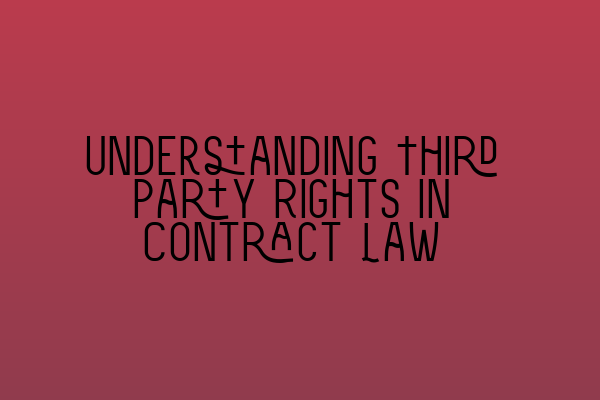Understanding Third Party Rights in Contract Law
Welcome to the SQE Contract Law blog, where we aim to provide valuable insights into various aspects of contract law. In this article, we will delve into the concept of third party rights in contracts, helping you understand their significance and implications.
What are Third Party Rights?
In contract law, a third party refers to someone who is not a party to the original contract but may have rights or interests that are affected by the contract. The law recognizes that individuals or organizations may have legitimate expectations or interests in the performance or enforcement of a contract, even if they are not directly involved in the contractual relationship.
When Do Third Party Rights Arise?
Third party rights can arise in different situations, such as when:
1. Intention to Create Legal Relations: If the parties to a contract intend to confer a benefit or impose an obligation on a third party, the third party may acquire rights or liabilities under the contract.
2. Assignment of Rights: Parties to a contract may assign their rights to a third party. This assignment can grant the third party the ability to enforce the contract or benefit from it as if they were an original party to the agreement.
3. Agency: In certain circumstances, an agent may contract on behalf of a principal. In such cases, the principal may acquire rights or liabilities under the contract, even though they are not directly involved in the negotiation or execution of the contract.
Enforcing Third Party Rights
The enforcement of third party rights depends on the applicable legal framework and the intentions of the parties involved. It is important to consider various factors, such as:
1. Intention of the Parties: If the contract clearly expresses the parties’ intention to confer rights or impose obligations on a third party, the third party may have a direct right to enforce the contract.
2. Privity of Contract: In some jurisdictions, the principle of privity of contract restricts third parties from enforcing contractual rights. However, many legal systems provide exceptions to this principle and recognize certain third party rights.
3. Statutory Provisions: Some statutes specifically confer third party rights in certain circumstances. It is crucial to be aware of any relevant legislation that may apply to your contract.
Practical Implications
Understanding third party rights can have significant practical implications for the drafting and negotiation of contracts. It is essential to consider the potential impact on third parties and to include appropriate provisions to address their rights and interests.
For example, if you are entering into a contract that involves subcontractors or suppliers, it may be important to include provisions that protect their rights in case of a dispute or non-performance by the main contracting parties. This can help avoid legal complications and ensure smoother business operations.
Conclusion
Third party rights in contract law can be complex, but understanding their implications is essential for lawyers and businesses alike. By considering the intention of the parties, the assignment of rights, and applicable legal provisions, you can navigate the legal landscape more effectively, protecting the rights and interests of all relevant parties.
To deepen your understanding of contract law, check out our related articles:
– SQE 1 Practice Exam Questions
– SQE 1 Practice Mocks FLK1 FLK2
– SQE 2 Preparation Courses
– SQE 1 Preparation Courses
– SRA SQE Exam Dates
Stay tuned for more informative articles on contract law and other legal topics. If you have any specific questions or topics you would like us to cover, feel free to reach out to us.
